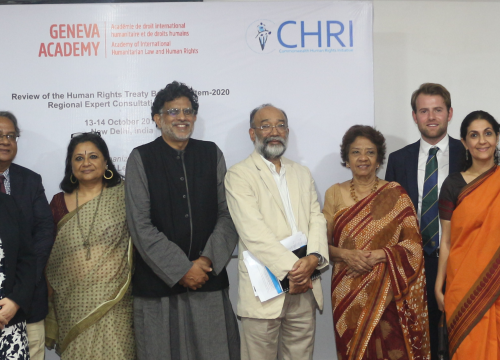A Regional Consultation in New Delhi on the Future of UN Treaty Bodies
17 October 2017
Our Academic Platform on Treaty Body Review 2020 just held its regional consultation for Asia in New-Delhi on 13-14 October 2017.
Hosted by the South Asian University and the Commonwealth Human Rights Initiative (CHRI) at the South Asian University campus, the New Delhi meeting brought in specialists from the region to share their views on the future of UN treaty bodies.
The Need to Reform and Strenghten the System
Participants discussed an extensive range of reform proposals. They reached consensus on several issues, including the need for a joint consolidation of the system itself (harmonization of calendars, rules of procedure and working methods, joint General Comments, state report examinations and follow-up) and in relation to its stakeholders (links with national human rights institutions and civil society).
‘Participants also called for a reform of the election of treaty body’s members and the incorporation of the SDGs and Agenda 2030 within their work’ underlines Domenico Zipoli, Research Assistant at the Geneva Academy. ‘They also asked for a comprehensive report on the treaty body system's achievements to showcase its value and the need to strengthen it’ adds Domenico Zipoli.
This event closes a series of seven regional consultations that took place in Africa, Asia, Middle East, North America, Latin America and Eastern and Western Europe since 2016.
‘These regional consultations allowed getting inputs from academics and experts in the different regions’ underlines Felix Kirchmeier, Manager of Policy Studies at the Geneva Academy. ‘These inputs will feed in our report that will include suggestions for the future of the UN treaty body system’ he adds.

About the Academic Platform on Treaty Body Review 2020
The United Nations (UN) human rights (HR) treaty bodies are a central pillar of the international HR protection system. They prevent HR violations by warning states about areas of concern, by advising them on durable solutions that address root causes and by adjudicating individual complaints.
Since the establishment of the first UN treaty body in 1970, both treaty ratifications and the treaty body system have expanded significantly. While this has enhanced HR protection worldwide, it has also created complex challenges that affect the system and those who interact with it: states, national HR institutions, UN entities, civil society organizations, individual complainants and rights-holders at large.
On 9 April 2014, the UN General Assembly (GA) adopted a landmark resolution (A/RES/68/268) on strengthening the treaty body system, which envisages a review of the measures taken at GA level in 2020. This review represents an opportunity to further reflect on the treaty body system’s future and develop innovative proposals and solutions without weakening the HR protection that the system currently affords.
The Geneva Academy is coordinating the academic input to this 2020 review via the creation of an academic network of independent researchers, a call for papers, a series of regional workshops, annual conferences in Geneva, as well as ongoing interactions with key stakeholders (i.e. states, UN treaty bodies, national HR institutions, civil society, UN entities and the Office of the UN High Commissioner for Human Rights).









